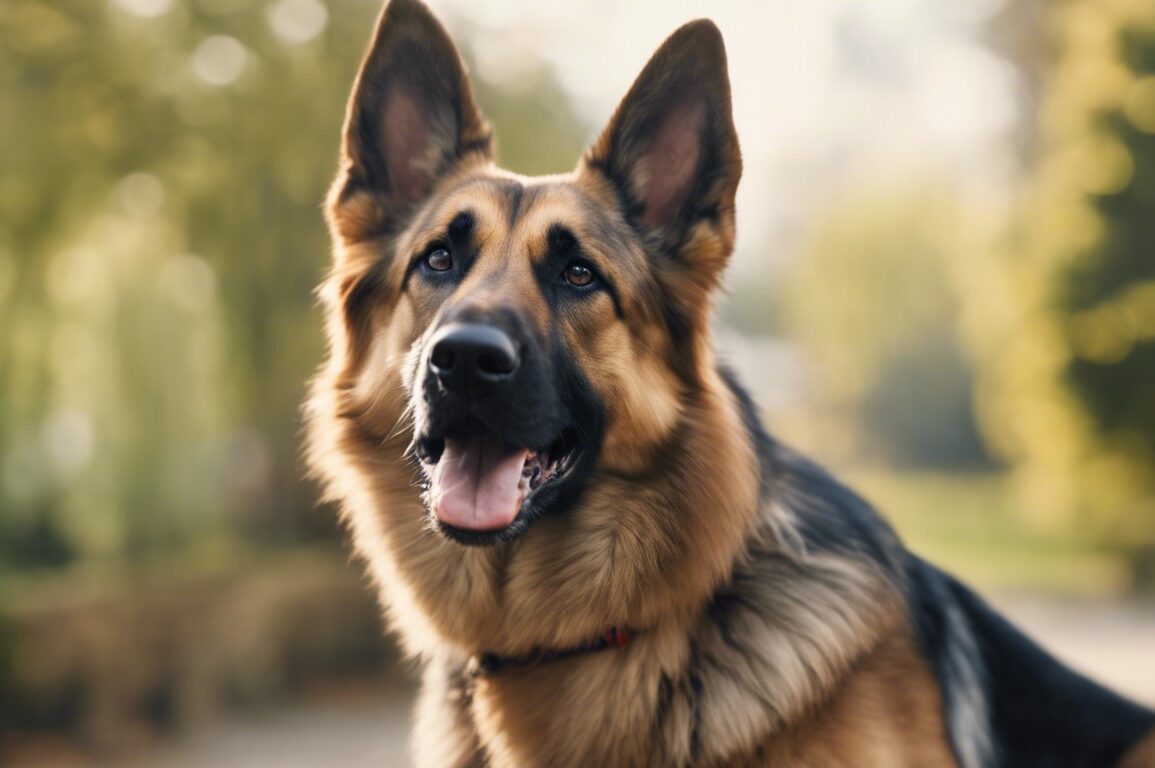As a devoted dog owner, you understand the unique bond that forms between you and your furry friend. Dogs bring joy, companionship, and unconditional love into our lives. One breed that exemplifies these qualities is the German Shepherd. Known for their intelligence, loyalty, and versatility, German Shepherds have captured the hearts of dog enthusiasts worldwide. In this in-depth guide, we will explore everything you need to know about this remarkable breed, from their appearance to their health, training, and nutrition.
Whether you’re a seasoned German Shepherd owner or considering adding one to your family, this guide will provide valuable insights and tips to help you better understand and care for your canine companion.
So, grab your pup’s favorite toy, settle into a cozy spot, and let’s dive into the world of German Shepherds!
Appearance
One look at a German Shepherd and it’s easy to see why they are one of the most recognizable breeds in the world. With their strong, athletic build, erect ears, and intelligent expression, German Shepherds exude confidence and power. They typically stand between 22 to 26 inches tall at the shoulder and weigh between 50 to 90 pounds. Their coat is dense and comes in a variety of colors, including black and tan, sable, and solid black.
German Shepherds have a distinct double coat that provides protection from the elements. The outer coat is dense and straight, while the undercoat is soft and thick. This breed sheds year-round, with heavier shedding occurring during seasonal changes. Regular grooming is essential to keep their coat healthy and reduce shedding.
One of the most striking features of the German Shepherd is their expressive, almond-shaped eyes that convey intelligence and alertness. Their gait is smooth and effortless, reflecting their athleticism and agility. Overall, the German Shepherd’s appearance is a perfect blend of strength, grace, and beauty.
History
The German Shepherd has a rich and storied history that dates back to the late 19th century in Germany. Captain Max von Stephanitz is credited with creating the breed by selectively breeding working dogs with the desired traits of intelligence, loyalty, and versatility. Originally used as herding dogs, German Shepherds quickly gained recognition for their exceptional abilities in various roles, including police work, search and rescue, and military service.
During World War I, German Shepherds served as messenger dogs, ambulance dogs, and guard dogs, showcasing their loyalty and courage on the battlefield. Their reputation as reliable and hardworking dogs continued to grow, leading to their popularity around the world. Today, German Shepherds are one of the most versatile and beloved breeds, excelling in a wide range of activities, from obedience and agility to therapy work and service roles.
The breed’s impressive history and legacy are a testament to the German Shepherd’s enduring qualities of loyalty, intelligence, and dedication to their human companions.
Temperament
When it comes to temperament, German Shepherds are known for their loyalty, courage, and intelligence. They are highly trainable and eager to please, making them ideal companions for active individuals and families. German Shepherds are protective by nature and will instinctively guard their home and loved ones. However, proper socialization and training are essential to ensure they develop into well-rounded and well-behaved dogs.
Despite their protective instincts, German Shepherds are also gentle and affectionate with their family members. They form strong bonds with their owners and thrive on companionship and attention. This breed is known for their unwavering loyalty and devotion, often becoming deeply attached to their human counterparts.
In addition to their loyalty and intelligence, German Shepherds are versatile and adaptable, excelling in a wide range of activities, from obedience and agility to scent work and search and rescue. Their high energy levels and drive to work make them well-suited for various roles, including service dogs, therapy dogs, and even actors in film and television.
Health
Like all breeds, German Shepherds are prone to certain health issues that owners should be aware of. Common health concerns for German Shepherds include hip and elbow dysplasia, degenerative myelopathy, bloat, and allergies. Regular veterinary check-ups, a balanced diet, and plenty of exercise can help prevent or manage these health conditions.
Proper nutrition is crucial for maintaining your German Shepherd’s overall health and well-being. A high-quality diet that is rich in protein and essential nutrients is essential to support their active lifestyle and prevent obesity. Avoiding table scraps and providing appropriate portion sizes will help prevent weight gain and associated health problems.
In addition to a nutritious diet, regular exercise is essential for keeping your German Shepherd healthy and happy. These energetic dogs thrive on physical activity and mental stimulation. Daily walks, playtime, and interactive toys are great ways to keep your German Shepherd engaged and prevent boredom. Regular exercise also helps maintain their muscle tone, joint health, and overall fitness.
Exercise
German Shepherds are high-energy dogs that thrive on physical activity and mental stimulation. Daily exercise is essential to keep them happy, healthy, and well-behaved. A lack of exercise can lead to boredom, anxiety, and destructive behaviors. To meet their exercise needs, aim for at least 60 minutes of vigorous activity each day, such as walks, runs, fetch, or agility training.
In addition to physical exercise, mental stimulation is crucial for keeping your German Shepherd engaged and fulfilled. Interactive toys, puzzle games, and obedience training are great ways to challenge their intellect and prevent boredom. German Shepherds are highly intelligent and thrive on learning new tasks and skills.
Outdoor activities, such as hiking, swimming, and agility courses, are excellent ways to provide both physical and mental exercise for your German Shepherd. These activities allow them to use their natural instincts and abilities, such as tracking scents, navigating obstacles, and working alongside their human companions. Engaging in activities that tap into their innate talents and skills will strengthen your bond and enhance their overall well-being.
Training
Training is a crucial aspect of owning a German Shepherd, as these intelligent and active dogs require mental stimulation and structure to thrive. Positive reinforcement techniques, such as praise, treats, and play, are effective for teaching new commands and behaviors. Consistency, patience, and clear communication are key to successful training sessions with your German Shepherd.
Start training your German Shepherd as early as possible to establish good habits and prevent unwanted behaviors. Basic obedience commands, such as sit, stay, come, and heel, are essential for ensuring your dog’s safety and well-being. Advanced training, such as agility, scent work, and therapy work, can further challenge your German Shepherd’s intellect and skills.
When training your German Shepherd, focus on building a strong bond and mutual trust. This breed thrives on positive interactions with their owners and responds well to praise and rewards. Establishing a clear hierarchy and consistent rules will help your German Shepherd understand their role in the family pack and promote good behavior.
Grooming
Grooming is an important aspect of caring for your German Shepherd’s coat and skin. Their double coat requires regular maintenance to keep it healthy and free of tangles and mats. Brushing your German Shepherd’s coat at least once a week will help remove loose fur, dirt, and debris, and distribute natural oils throughout their coat.
Bathing your German Shepherd every 6 to 8 weeks is typically sufficient to keep them clean and odor-free. Use a gentle dog shampoo that is formulated for their skin and coat type to avoid drying out their skin. Be sure to thoroughly rinse their coat to remove all traces of shampoo and prevent irritation.
In addition to regular brushing and bathing, other grooming tasks for German Shepherds include nail trimming, ear cleaning, and dental care. Trim your dog’s nails every 4 to 6 weeks to prevent overgrowth and discomfort. Clean their ears regularly to prevent infections and remove wax buildup. Brushing their teeth daily or providing dental chews can help prevent dental issues and keep their breath fresh.
Nutrition
Proper nutrition is essential for maintaining your German Shepherd’s health, energy levels, and overall well-being. A high-quality diet that is rich in protein, vitamins, and minerals is crucial to support their active lifestyle. Look for dog foods that list meat as the first ingredient and avoid fillers, artificial ingredients, and by-products.
Feeding your German Shepherd a balanced diet that meets their nutritional needs is key to preventing obesity and promoting a healthy weight. Portion control is important to prevent overeating and weight gain. Consult with your veterinarian to determine the appropriate amount of food for your dog based on their age, weight, and activity level.
Consider feeding your German Shepherd a diet that is tailored to their specific needs, such as puppy, adult, or senior formulas. Some German Shepherds may have food sensitivities or allergies, so it’s important to monitor their reactions to different ingredients and make adjustments as needed. Providing fresh water at all times is essential to keep your dog hydrated and healthy.
Conclusion
In conclusion, the German Shepherd is a remarkable breed that embodies loyalty, intelligence, and versatility. From their striking appearance to their loving temperament, German Shepherds make wonderful companions for individuals and families alike. By understanding their unique characteristics and needs, you can provide the best care and support for your furry friend.
Remember to prioritize their health, exercise, training, grooming, and nutrition to ensure a happy and fulfilling life for your German Shepherd. With proper care and attention, your German Shepherd will reward you with unwavering loyalty, love, and companionship for years to come. So, embrace the journey of being a German Shepherd owner and cherish the special bond you share with your canine companion!
Thank you for joining us on this comprehensive guide to the world of German Shepherds. May your adventures with your furry friend be filled with joy, laughter, and unforgettable memories!
Are German Shepherds good family dogs?
Yes, German Shepherds can make excellent family dogs. They are loyal, protective, and form strong bonds with their families. Proper socialization and training are important to ensure they are well-adjusted and good with children.
Do German Shepherds require a lot of exercise?
Yes, German Shepherds are an active breed that requires regular exercise to stay mentally and physically stimulated. They enjoy activities such as walking, running, playing fetch, and participating in dog sports.
Are German Shepherds prone to any health issues?
Like many large breeds, German Shepherds can be prone to certain health issues such as hip and elbow dysplasia, degenerative myelopathy, and bloat. Responsible breeding practices and regular vet check-ups can help minimize these risks.


